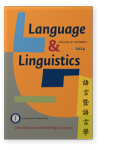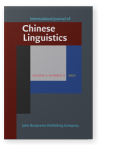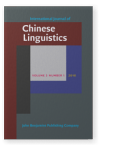Barry C.-Y. Yang
List of John Benjamins publications for which Barry C.-Y. Yang plays a role.
2024 Topic drop and pro drop Language and Linguistics 25:1, pp. 1–27 | Article
One major difference between Chinese-type and German-type languages is that the former allows extensive types of argument drop, while the latter is quite limited beyond the existence of a null topic. This study argues (a) that it is necessary to distinguish among phenomena that have sometimes… read more
2024 Revisiting sentence-final adjunct WHAT Language and Linguistics 25:1, pp. 162–186 | Article
The sentence-final adjunct WHAT has been given much attention for the past few years, mostly on its why-like interpretation and negative force. In this study, evidence will be provided to show that what otherwise seems to be exceptional cases, in effect, constitutes an independent construction,… read more
2021 Two types of peripheral adjunct WHATs Concentric 47:1, pp. 61–92 | Article
This study investigates two types of adjunct WHATs merged at peripheral positions in Chinese. The L-WHAT is merged within VP and denotes a why-interpretation with an aggressive, prohibitive force. The H-WHAT is merged at the left periphery of a sentence and is exclusively used in expressing a… read more
2021 On the position of ReasonP International Journal of Chinese Linguistics 8:2, pp. 291–313 | Article
The position of the reason-asking ‘why’ has been under much discussion for the past few years. Although some have suggested that it is situated within the CP domain, its exact position varies depending on different proposals. Meanwhile, a noncanonical why-like ‘what’ has also attracted much… read more
2016 Decomposing polysemy: A structural perspective from the ka -construction in Taiwan Southern Min International Journal of Chinese Linguistics 3:1, pp. 132–159 | Article
The ka-construction in Taiwan Southern Min is well-known for its polysemy. This study argues that with evidence from extra-argumentality, ka-NP position, thematic relationship, passivization, over-generalization, and dialectal difference, ka should at least be categorized into three different… read more



